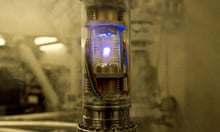Well, scientists have captured anti-matter. An atom or two for a fifth of a second. I'm sorry, but until there is a whole planet of the stuff with alien beings to whom we can't talk for fear of going boom, I refuse to be more than a bit impressed. I remember the end of James Blish's Cities in Flight sequence, when two whole universes were about to collide and Mayor Amalfi was there at Point Zero trying to be turned into the big bang for a whole new universe. Now, that was cool.
One problem with being a long-term reader of science fiction and fantasy is that you get blase about science itself because you have seen it all before. My sense of wonder was overloaded by the time I was 16; I am never going to get that rush again. Even major breakthroughs make me go 'Whatever!'.
Partly that's because, despite all our advances, we still haven't got time travel, reptilian visitors from the Galactic Federation, or telepathy. Instead, we get the depressing environmental disasters that JG Ballard described, and crazed grinning fundamentalist politicians straight out of Philip K Dick. (I'm sure that if I went through all his Ace doubles from the early 1960s, I would find Sarah Palin somewhere.) We don't get the stories where someone smart gets to fix the problem with a bent paperclip; we get the grim logical stories where we are all going to die.
Another part of the problem is that we do, in fact, live in a world that is a collage of a lot of sci fi tropes – but, as the writer Neil Gaiman's Second Law tells us: "All scientifically possible technology and social change predicted in science fiction will come to pass, but none of it will work properly." It's amazing that we have tiny mobile phones with which we can send photographs of masturbating walruses to our friends on the other side of the world, but less fabulous that you lose signal in a five-yard patch on the Hackney Road just as someone is telling you something important. One of the reasons why Dick and Ballard speak to our condition so well is that they saw the future and it was pretty rubbish.
No one has ever read science fiction primarily as a more entertaining horoscope – we read it because it is fun to follow writers through satirical guesses about evil ad agencies or fast jetpack chases through vast underground caverns. We love it almost more when we know that it is showing us things that never were and could never be – like the desert but habitable Mars of Leigh Brackett's adventure stories or Ray Bradbury's mordant tales of the revenge of the colonised.
It is almost a cliché that most sci fi is a way of looking sideways at the time in which it was written – the reason why William Gibson's Neuromancer felt so relevant in the 1980s was simply that it was a book whose imagined technology was mostly just around the corner, and whose doomed hipster technobandits were already walking down mean streets in cities near us. It's significant that Gibson has moved to writing contemporary fiction with hardly a change of register.
Science fiction does something that science cannot always do – it provides ways of surviving the present; the one accurate thing it does tell you about the future is that it is going to be unimaginably different and in some ways better. There is a reason why so many teenagers read a lot of sci fi and it is because it helps them through the bullying, the feelings of worthlessness, and the tendency to self-contempt. As a lanky, stammering transgender teenager in Leeds, one of the things that kept me going was spending time with rebels against galactic empires, or persecuted telepathic mutants. I, like them, was the downtrodden salt of the earth; and, like them, I would prevail. All that cool stuff that has blunted my capacity for wonder helped me survive by telling me that one day I too might be cool.


